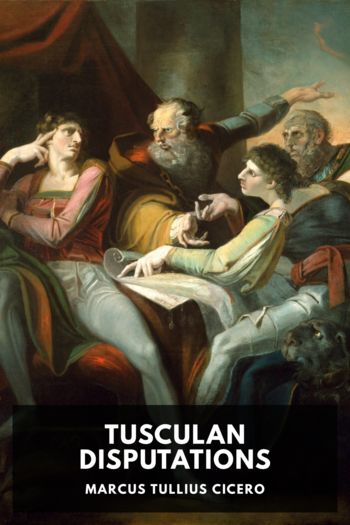Tusculan Disputations - Cicero (red novels TXT) 📗

- Author: Cicero
Book online «Tusculan Disputations - Cicero (red novels TXT) 📗». Author Cicero
But as the cause of perturbations is now discovered, for all of them arise from the judgment or opinion, or volition, I shall put an end to this discourse. But we ought to be assured, since the boundaries of good and evil are now discovered, as far as they are discoverable by man, that nothing can be desired of philosophy greater or more useful than the discussions which we have held these four days. For besides instilling a contempt of death, and relieving pain so as to enable men to bear it, we have added the appeasing of grief, than which there is no greater evil to man. For though every perturbation of mind is grievous, and differs but little from madness, yet we are used to say of others when they are under any perturbation, as of fear, joy, or desire, that they are agitated and disturbed, but of those who give themselves up to grief, that they are miserable, afflicted, wretched, unhappy. So that it does not seem to be by accident, but with reason proposed by you, that I should discuss grief and the other perturbations separately, for there lies the spring and head of all our miseries. But the cure of grief and of other disorders is one and the same in that they are all voluntary, and founded on opinion; we take them on ourselves because it seems right so to do. Philosophy undertakes to eradicate this error, as the root of all our evils. Let us therefore surrender ourselves to be instructed by it, and suffer ourselves to be cured, for while these evils have possession of us, we not only cannot be happy, but cannot be right in our minds. We must either deny that reason can effect anything, while, on the other hand, nothing can be done right without reason, or else, since philosophy depends on the deductions of reason, we must seek from her, if we would be good or happy, every help and assistance for living well and happily.
Book V Whether Virtue Alone Be Sufficient for a Happy LifeThis fifth day, Brutus, shall put an end to our Tusculan Disputations, on which day we discussed your favorite subject. For I perceive from that book which you wrote for me with the greatest accuracy, as well as from your frequent conversation, that you are clearly of this opinion: that virtue is of itself sufficient for a happy life. And though it may be difficult to prove this, on account of the many various strokes of fortune, yet it is a truth of such a nature that we should endeavor to facilitate the proof of it. For among all the topics of philosophy, there is not one of more dignity or importance. For as the first philosophers must have had some inducement to neglect everything for the search of the best state of life, surely the inducement must have been the hope of living happily, which impelled them to devote so much care and pains to that study. Now, if virtue was discovered and carried to perfection by them, and if virtue is a sufficient security for a happy life, who can avoid thinking the work of philosophizing excellently recommended by them, and undertaken by me? But if virtue, as being subject to such various and uncertain accidents, were but the slave of fortune, and were not of sufficient ability to support herself, I am afraid that it would seem desirable rather to offer up prayers than to rely on our own confidence in virtue as the foundation for our hope of a happy life. And, indeed, when I reflect on those troubles with which I have been so severely exercised by fortune, I begin to distrust this opinion, and sometimes even to dread the weakness and frailty of human nature, for I am afraid lest, when nature had given us infirm bodies, and had joined to them incurable diseases and intolerable pains, she perhaps also gave us minds participating in these bodily pains, and harassed also with troubles and uneasinesses peculiarly their own. But here I correct myself for forming my judgment of the power of virtue more from the weakness of others, or of myself perhaps, than from virtue itself, for she herself (provided there is such a thing as virtue—and your uncle Brutus has removed all doubt of it) has everything that can befall mankind in subjection to her, and by disregarding such things, she is far removed from being at all concerned at human accidents, and, being free from every imperfection, she thinks that nothing which is external to herself can concern her. But we, who increase every approaching evil by our fear, and every present one by our grief, choose rather to condemn the nature of things than our own errors.
But the amendment of this fault, and of all our other vices and offences, is to be sought for in philosophy. And as my own inclination and desire led me, from my earliest youth upward, to seek her protection, so, under my present misfortunes, I have had recourse to the same port from whence I set out, after having been tossed by a violent tempest. O Philosophy, thou guide of life! thou discoverer of virtue and expeller of vices! what had not only I myself, but the whole life





Comments (0)